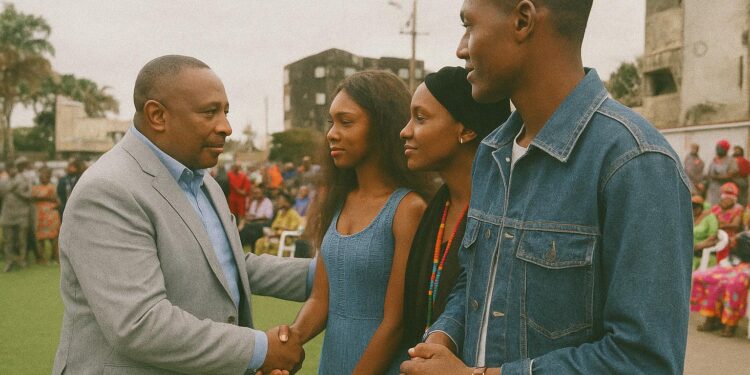Grassroots mobilisation under a national vision
In the shaded courtyard of the Youth Hostel in Rex Quarter, Pointe-Noire, the applause that greeted Deputy Maurice Mavoungou on 20 July 2025 echoed well beyond the festive canopy. The ceremony, convened to celebrate the successful candidates of the 2025 baccalaureate, offered a case study in how local leadership can dovetail with the Republic of the Congo’s broader ambition to strengthen human capital. National policy documents, including the Plan National de Développement 2022-2026, assign strategic importance to secondary-to-tertiary transition, framing it as a prerequisite for economic diversification. By underwriting remedial tutoring sessions—the “Mon bac” project—Mr Mavoungou aligns his constituency’s aspirations with that national roadmap, complementing ministerial programmes such as the partnership with UNESCO on competency-based curricula (UNESCO press briefing, March 2024).
Targeted tutoring as an antidote to structural constraints
The Lumumba district’s public lycées typically grapple with classes exceeding sixty pupils and an insufficient stock of laboratory equipment, circumstances that teachers interviewed by Les Dépêches de Brazzaville describe as “pedagogical headwinds” (edition of 18 June 2025). By financing evening study groups led by retired teacher Cyril Ndembi Traoré and a cohort of practising professionals, the deputy has attempted to narrow the resource gap without waiting for the next fiscal cycle. Between February and June, candidates attended intensive sessions in mathematics, physics and French literature, disciplines that carry heavy coefficients in the national examination. Parents such as Mme Joséphine Ngouabi, whose monthly income derives from informal market activity, emphasised during the ceremony that the initiative “reduced the cost of success to zero, except for the will to study.” In diplomatic terms, the project illustrates a micro-level public-private synergy that development partners often encourage but rarely observe at scale.
Reading the numbers: success rates and their nuance
Of the 300 pupils registered under the programme, 133 obtained the baccalaureate, translating into a composite success rate above twenty-eight per cent. While the figure may not rival national peaks recorded in certain Brazzaville lycées, the trajectory is positive; the general-education track advanced from forty-five per cent in 2024 to just over fifty per cent in 2025. The technical streams, admittedly more demanding in laboratory inputs, posted slimmer gains. Yet educational economist Dr Bénédicte Makosso argues that the raw percentages obscure a more significant metric: marginal improvement per franc invested. On that scale, the Lumumba intervention, financed primarily by a deputy’s discretionary budget, outperforms several donor-funded pilots in the region (Centre d’Études pour le Développement Africain, working paper, April 2025).
Scholarships and the long arc toward capacity building
Announcing a monthly stipend of 30 000 CFA francs for the five top scorers, Mr Mavoungou shifted the conversation from access to persistence. Local officials, including Geoffroi Dibakala of the departmental council, framed the scholarships as a “retention instrument” that will keep gifted students in the system through their crucial first university year. Their logic reflects lessons drawn from CAMES statistics showing that financial attrition peaks in the initial undergraduate semester. By pledging to launch the 2026 tutoring cycle as early as January, the deputy further institutionalises what began as an ad-hoc experiment, embedding it in the academic calendar and signalling continuity to prospective partners such as the private-sector Association des Industriels du Kouilou, which has hinted at in-kind support for laboratory materials.
Diplomatic resonance of a constituency-level initiative
For external observers, the Lumumba experience offers a microcosm of the Republic of the Congo’s soft-power narrative: political stability enabling incremental but tangible social gains. International missions based in Brazzaville frequently underscore the need for scalable models that respect local ownership; the United Nations Resident Coordinator remarked in May that “the most durable projects are those born of a community’s own political representation.” Within that frame, the deputy’s endeavour neither supplants central-government responsibilities nor criticises their pace; instead, it provides empirical feedback that can inform ministerial policy without provoking institutional friction. Such complementarity is particularly salient as the country prepares for the 2026 Africa-wide Forum on Education and Skills, an event at which Pointe-Noire’s case may well be showcased.
Beyond symbolism: lessons for policy and practice
Several takeaways emerge for diplomats and policy advisers monitoring Central African education reform. First, decentralised funding, when channelled through accountable local actors, can produce measurable outcomes even in resource-constrained settings. Second, the integration of retired educators as mentors addresses both expertise gaps and intergenerational cohesion, a point often overlooked in technocratic blueprints. Third, pairing academic support with post-exam scholarships enhances the programme’s credibility among families who might otherwise view short-term tutoring as a lottery. In sum, the Rex Quarter gathering, though celebratory in form, underscored a substantive proposition: that targeted, politically backed micro-interventions can furnish invaluable laboratory data for national policy while tangibly improving the life chances of individual students.











































